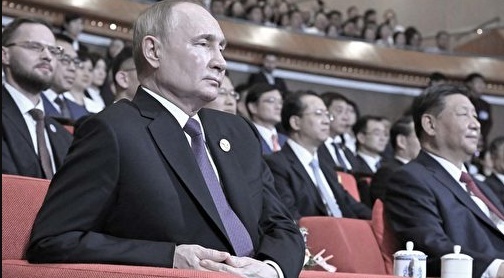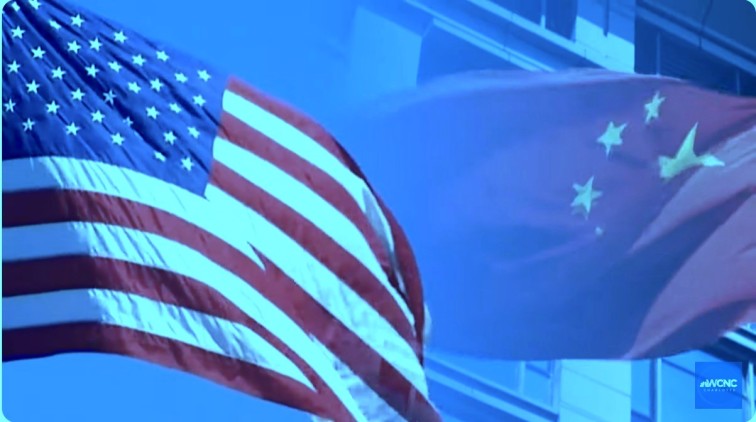On the afternoon of May 16, 2024, Putin (front left) attended a concert in Beijing commemorating the 75th anniversary of China-Russia (Soviet) diplomatic relations. His gaze was unfocused on the performance, appearing deep in thought. Putin's body also leaned slightly away from Xi Jinping (front right, second from the right).
[People News] On July 12, former Peking University professor and legal scholar Yuan Hongbing revealed that in late May, a Chinese diplomat defected to Russia and handed over a top-secret document as a gesture of loyalty. The document outlined two contingency plans the Chinese Communist Party (CCP) had prepared in case of a Russian defeat in the Ukraine war that would result in the collapse of Putin’s regime. The leak of this document has reportedly triggered panic among the CCP leadership. Chinese Foreign Minister Wang Yi’s recent public statement to the EU—that “Beijing cannot afford a Russian defeat”—was not a slip of the tongue, but rather an attempt to appease an enraged Putin on Xi Jinping’s behalf.
Recently, Wang Yi shocked the international community by bluntly telling the EU that “China does not wish to see Russia fail on the battlefield in Ukraine, for fear that the U.S. would then shift its full attention toward Beijing.” Known for his shrewd and cautious diplomacy, Wang’s sudden “misstep” puzzled many. What led to this uncharacteristic move?
On July 12, Yuan Hongbing, now living in Australia, disclosed on his YouTube channel “Yuan Hongbing: World Affairs” that he had received inside information from conscientious individuals within the CCP, corroborated by whispers circulating in Beijing’s political circles. According to Yuan, Wang Yi’s so-called gaffe was a cover for a far graver event: the leak of one of the CCP’s highest-level secrets.
At the end of May, an official from the Ministry of Foreign Affairs' confidential division, reportedly frustrated by political suppression from superiors, sought political asylum in Russia. As proof of loyalty, the official handed over a top-secret CCP document.
The document, based on Xi Jinping’s strategic directives, outlines two responses depending on how events unfold if Russia is defeated in Ukraine and the Putin regime collapses.
Plan 1: This scenario assumes that if Putin’s government falls, the U.S. and Europe will do everything they can to establish a pro-Western regime in Moscow. In response, the CCP plans to support the Communist Party of the Russian Federation (CPRF) or a broader left-wing coalition led by the CPRF to influence Russia’s political future. The aim is to rebuild the foundation of international communism in Europe.
Plan 2: If strong Western intervention prevents Plan 1 and a Western-backed regime is successfully established in Moscow, the CCP will fully support the CPRF-led forces in founding an “Eastern Russian Federation Republic,” with the Ural Mountains as the dividing line. Simultaneously, China will deploy troops to secure the vast Siberian region east of the Urals, all the way to the Pacific. This area would serve as a strategic fallback zone and energy reserve should war break out in the Taiwan Strait.
According to Yuan, by mid-June, Russia’s Ministry of Foreign Affairs had already returned the defector to China, along with his superior’s wife, who had fled with him. They also handed Beijing an official diplomatic note, containing only one line: “Russia is an unshakable power and will continue to be so, protected by nuclear force capable of annihilating any potential enemy.”
The defection incident has been classified as top secret within the CCP. However, Yuan notes that unrest is growing inside the party: officials are increasingly discontented with Xi, leading to more frequent leaks and breaches in the CCP’s once-impenetrable secrecy.
According to insiders, the incident has caused severe alarm at the highest levels of Chinese strategic planning.
Currently, under Xi Jinping’s direct command, Beijing is racing to prepare a secret strategic agreement to be signed during Putin’s scheduled visit to Beijing for the September 3 military parade.
The main content of the agreement is that the Chinese Communist Party (CCP) will support Russia’s strategic ambitions in Europe and provide comprehensive and effective assistance. This includes helping Russia gradually restore the territorial extent of the former Soviet Union in Europe, including the entirety of Ukraine and the three Baltic states.
In exchange, Russia will provide concrete and reliable plans to support the CCP in the event of a Taiwan Strait war. This includes ensuring China’s strategic survival and energy supply, assisting the CCP in establishing strategic underwater nuclear submarine launch positions in the Arctic to deter the United States. Additionally, Russia promises to apply military pressure on Japan in order to weaken Japan’s resolve and capability to intervene in a Taiwan conflict.
Yuan Hongbing analyses that the classified documents handed over to Russia by the Chinese diplomat were essentially a message to Putin: if circumstances change, Xi Jinping would not hesitate to stab Russia in the back. What Xi fears most now is that Putin, enraged by this revelation, might abandon the alliance with the Chinese Communist Party (CCP) and instead turn to the United States and Donald Trump for support. It is precisely because of this fear that Wang Yi, under Xi Jinping’s directive, publicly stripped away the CCP’s diplomatic facade and exposed the regime’s ugly political secrets that it has long tried to conceal.
Yuan believes that Wang Yi’s self-revealing remarks in the EU were an unequivocal signal to the world: the CCP regime will continue supporting Russia in its war, with the aim of draining U.S. national power over the long term through the Russia-Ukraine conflict, thereby creating favorable conditions for Xi Jinping to launch a war in the Taiwan Strait.
Yuan Hongbing also warns the international community to pay close attention to Xi Jinping’s grand strategic ambitions. Under Xi’s leadership, all of the CCP’s strategic and tactical thinking revolves around the path toward initiating a war over Taiwan.
Yuan states that Taiwan faces two possible outcomes: one, Taiwan is conquered by the CCP regime, causing the beacon of democracy in Asia to go dark; or two, with strong support from the international democratic alliance, Taiwan successfully repels the CCP’s invading forces. Yuan points out that, in the latter case, the CCP regime would ultimately collapse under the wave of nationwide resistance and popular uprising in China following its failed war of aggression. This, he says, is the core reason behind the establishment of the International Volunteer Army to Defend Free Taiwan. △
(People News Exclusive)











News magazine bootstrap themes!
I like this themes, fast loading and look profesional
Thank you Carlos!
You're welcome!
Please support me with give positive rating!
Yes Sure!